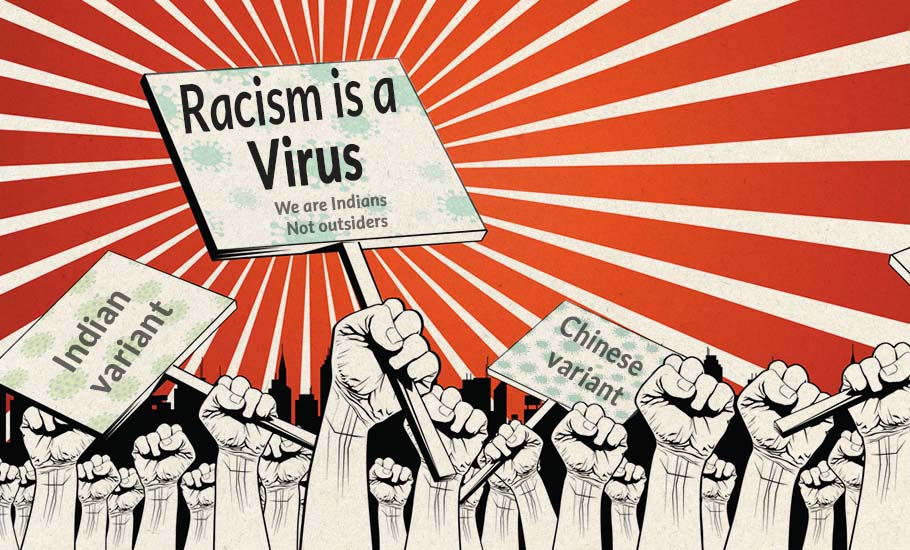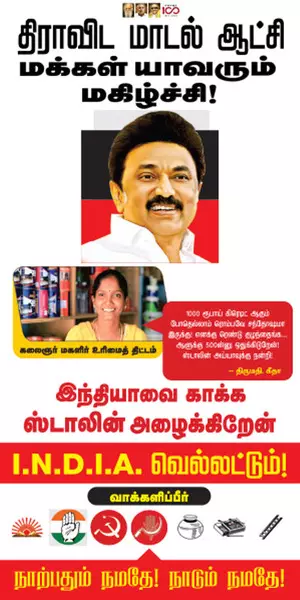
- Home
- News
- Analysis
- States
- Perspective
- Videos
- Education
- Entertainment
- Elections
- World Cup 2023
- Features
- Health
- Business
- Series
- Economy Series
- Earth Day
- Kashmir’s Frozen Turbulence
- India@75
- The legend of Ramjanmabhoomi
- Liberalisation@30
- How to tame a dragon
- Celebrating biodiversity
- Farm Matters
- 50 days of solitude
- Bringing Migrants Home
- Budget 2020
- Jharkhand Votes
- The Federal Investigates
- The Federal Impact
- Vanishing Sand
- Gandhi @ 150
- Andhra Today
- Field report
- Operation Gulmarg
- Pandemic @1 Mn in India
- The Federal Year-End
- The Zero Year
- Premium
- Science
- Brand studio
- Home
- NewsNews
- Analysis
- StatesStates
- PerspectivePerspective
- VideosVideos
- Entertainment
- ElectionsElections
- Sports
- Loading...
Sports - Features
- BusinessBusiness
- Premium
- Loading...
Premium

In 2021, the virus mutated, so did racism

Coronavirus, our rhetorical selves, declared was a great leveller. It took down the rich as it took down the poor. It spread across the ‘civilised’ West as it swept the ‘uncouth’ East. From West to East, from North to South, Covid also exposed that racism itself was a global pandemic. ‘Corona’ has been the latest addition to invectives such as ‘chinky’, ‘momo’,...
 Coronavirus, our rhetorical selves, declared was a great leveller. It took down the rich as it took down the poor. It spread across the ‘civilised’ West as it swept the ‘uncouth’ East. From West to East, from North to South, Covid also exposed that racism itself was a global pandemic.
Coronavirus, our rhetorical selves, declared was a great leveller. It took down the rich as it took down the poor. It spread across the ‘civilised’ West as it swept the ‘uncouth’ East. From West to East, from North to South, Covid also exposed that racism itself was a global pandemic.
‘Corona’ has been the latest addition to invectives such as ‘chinky’, ‘momo’, ‘bahadur’ and ‘Chinese’ often hurled at the people from Northeast India as the geo-tagging of a deadly virus and its mutants spiralled an existent social evil to the extreme across the globe.
A study conducted under the aegis of the Indian Council of Social Science Research (ICSSR) earlier this year found that people from the Northeast “faced an increased number of acts of hate and prejudices against them” since the outbreak of Covid-19 in 2020.
The finding was based on personal interviews of around 1,200 people from Arunachal Pradesh, Assam, Meghalaya, Manipur, Mizoram, Nagaland and Tripura in six metropolitan cities — Mumbai, Pune, Delhi, Chennai, Bengaluru and Hyderabad.
Most victims felt that the prime reason for the racial bias against them in the wake of the pandemic, which began in China in December 2019, was to do with their facial features being ‘similar’ to those of the Chinese people.
Despite a World Health Organisation (WHO)’s recommendation in 2015 against naming any disease after a geographical location, many including world leaders like then US president Donald Trump started disparagingly calling the deadly virus that triggered a global pandemic as “Chinese virus”. “#ChinaVirus” and “#WuhanVirus” were trending on social media in several countries after the outbreak of the disease. Wuhan is the Chinese city where the virus was first detected.
Similar stereotyping has been witnessed again after a highly mutated variant of the virus was identified in South Africa in November this year, setting off a global concern particularly about vaccine efficacy.
The first infection of the new Omicron variant was detected among foreign visitors to Botswana. South African researchers flagged it to the global health community, prompting media, experts, and others indiscreetly calling it a “South African variant”. This again triggered a knee-jerk reaction from Western nations who rushed to impose a travel ban against most southern African countries.
A German newspaper Die Rheinpfalz published a front-page story on November 28 under the headline, “The virus from Africa is with us”. The story was accompanied by a photo of two Black Africans.

The same day a Spanish newspaper, La Tribuna de Albacete, published a cartoon depicting the Omicron variant as comic characters with brown skin and Afro-textured hair approaching.

It showed that the virus boarded on a boat with a South African flag was approaching a shore marked with a European Union flag.
Reacting to the Spanish cartoon, WHO chief Tedros Adhanom Ghebreyesus tweeted:
It pains me that shows of racism like this still plague the challenges facing the world today.
Caricaturing people crammed in a boat bringing a virus to Europe is disgusting.
We can only advance, as one ? community, by promoting solidarity, not stigma. https://t.co/FtZIJKaIQ4— Tedros Adhanom Ghebreyesus (@DrTedros) December 6, 2021
Similar irresponsible tagging of the disease led to a rise in racism and physical violence against people of East Asian and Southeast Asian descent and appearance around the world in 2020. In India, people from Northeast, who are mostly of Mongoloid race, became targets of hate even as the country’s right-wing leaders joined the global cacophony scapegoating China.
Union Home Minister Amit Shah, deviating from India’s official stand not to label the virus and stigmatise China, criticised the neighbouring country for the spread of the COVID-19 in an article in a leading newspaper.
“The interests of farmers and businessmen of the country were protected by opposing RCEP, whose importance is further underlined by China’s role in the coronavirus situation,” he wrote in The Times of India.
“Xi [Chinese president Xi Jinping] has misjudged India. You live in a time warp India moved away from 1962. Your gift of Chinese Virus will always be remembered in the history of unmaking of China. Stop blabbering and come to your senses at the earliest,” BJP MP Meenakshi Lekhi tweeted.
BJP’s lone MLA in Telangana Raja Singh and his supporters held a torch-light march chanting, “Go back, go back, Chinese virus go back,” to get rid of the disease.
The Swadeshi Jagran Manch – a frontal outfit of the BJP’s ideological fountainhead, the Rashtriya Swayamsevak Sangh (RSS) – too labelled the coronavirus as “Chinese virus”.
The racial profiling of the disease had a damaging impact with more and more people from the Northeast getting “harassed, abused and traumatised” and called ‘coronavirus’, as pointed out by the ICSSR research.
Such attacks just after the outbreak of the pandemic last year led to an exodus of hundreds of nurses from Northeastern states in Kolkata—the city not included in the ICSSR research—causing shortage of caregivers.
By 2021, the Indian community became the target of hate from the US to Singapore as a coronavirus variant (B.1.617.2 or Delta) first detected in India spread to other countries amid skyrocketing positive cases in India.
Social media in the US was littered with posts blaming the Indian community for the spread of the new variant. Police data cited by the Voice of America showed a whopping 164 per cent increase in racial attacks on Asians in that country in the first quarter of 2021.
Faced with growing cases of racial attacks on Indians following the advent of the more virulent variant of the virus, Singapore’s Prime Minister Lee Hsien Loong expressed serious concern over the development saying the “attacks go against everything that our multicultural country stands for. It harms our international reputation more than we realise”.
“This is dangerous for Singapore because first it’s expat Indians then it will be Singaporeans of Indian origin. Eventually all Indians will be targets of hate,” the country’s home minister Kasiviswanathan Shanmugam told Parliament, admitting the spurt in racial attacks in his country where Indians were called “rapists” and “cockroaches”.
The growing hate campaign against Indians in different countries prompted India’s Information Technology (IT) ministry to write to all social media companies to take down any content that refers to a particular variant of the coronavirus as “Indian variant”.
The discrimination did not end there. The United Kingdom and India had a diplomatic wrangle over a travel rule introduced by the former. It stipulated self-isolation for 10 days for Indian travellers visiting the UK even after being vaccinated with Covishield. India’s other vaccine, Covaxin, was not even in the contention as it was yet to be recognised by WHO.
The UK’s decision smacked of racism as Covishield is a version of the Oxford-AstraZeneca vaccine made by Serum Institute of India following technology transfer.
The issue was eventually resolved by some robust diplomacy that saw India even threatening tit-for-tat measures.
Vaccine apartheid was also witnessed in other forms. When the US began to roll out COVID-19 vaccines earlier this year, uptake in black communities lagged behind their white counterparts, reported the Bhekisisa Centre for Health Journalism, an independent media outlet that focuses on health and social justice issues.
“Many assumed this was by choice: the history of medical abuses against them had supposedly left African Americans distrustful of public-health intervention. A similar vaccine hesitancy has also purportedly hampered efforts to vaccinate African populations,” the report added.

There were also allegations of rich Western countries like the US and the UK and pharmaceutical companies sitting on vaccine patents which they were refusing to share leaving the poor countries high and dry for the jab for their citizens.
“I will not stay silent when the companies and countries that control the global supply of vaccines think the world’s poor should be satisfied with leftovers,” the WHO chief had said amid vaccine inequality.
United Nations chief Antonio Guterres called the inequality, “A moral indictment of the state of our world. It is an obscenity.”
Sadly, pandemic-induced or not, racism is not going to end anytime soon as the South African experience showed. After all, logic is no match for hysteria.




